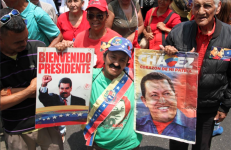Can the Bolivarian revolution survive the Venezuelan crisis?

Creating the space for and allowing the Bolivarian Revolution to flourish is perhaps the most important achievement of Venezuela’s Chavista government — but can it survive the current crisis?
In Venezuela, the eyes of the global media and commentators are fixed on the battle for the presidency, with the country’s legitimate president Nicolás Maduro in one corner and the US-backed President of the National Assembly and self-declared head-of-state Juan Guaidó in the other. Fears of a US intervention or civil war are widespread, while criminal sanctions imposed by foreign powers — the US in particular — combined with government corruption and mismanagement have devastated the national economy.
The poor state of Venezuela’s economy is often presented by right-wing pundits as a failure of the country’s socialist Chavista governments that have ruled the country for the last 20 years. But this shortsighted analysis ignores both role played by international powers in their efforts to crush the radical socialist experiment that has taken root in Venezuela, as well as the historic gains of the Bolivarian Revolution in the fields of poverty reduction, education, increasing equality, housing, the radical democratization of the country from the bottom up, and more.
To shift the focus away from the battle for the presidential throne, we asked a group of international experts to share their thoughts on the chances of survival of that most important, inspiring and admirable achievement of the Venezuelan people: the Bolivarian Revolution. Expressed in the agricultural and urban communes, the worker cooperatives, social movements and local councils, the Bolivarian revolutionary process preceded the Chavista governments by many years, and the key question right now is: has it a chance to outlast it too?
The replies below look at the Bolivarian Revolution and the Venezuelan crisis from a number of different angles and reach different conclusions — not all of which are necessarily representative of ROAR’s position on the topic. We offer these different perspectives on the assumption that the critical and intelligent reader will be able to make up their own mind as to which reading they find most persuasive, and which position they are most comfortable to align themselves with.
Many thanks to Sujatha Fernandes, Richard D. Wolff, Julia Buxton, Dario Azzellini, George Ciccariello-Maher, Raúl Zibechi, Gabriel Hetland and Cira Pascual Marquina for taking the time to answer the following question: Can the Bolivarian revolution survive the current political and economic crisis in Venezuela?
DARIO AZZELLINI
Lecturer at Cornell University, author of “Communes and Workers’ Control in Venezuela: Building 21st Century Socialism from Below” (2017).
If by “Bolivarian revolution” we refer to the Venezuelan government, the response is not easy. We can affirm that it survived the political and economic crisis better and longer than all its enemies expected. Besides the drop in oil prices and the government’s own mistakes, one other cause of the current crisis is the international pressure on Venezuela, ranging from economic boycotts, financial sanctions and the illegal confiscation of billions of dollars deposited in international banks, to sabotage carried out by mercenaries and terrorist cells.
Over the past 20 years, all efforts by the US, the Venezuelan opposition, some EU countries and the Latin American far-right to achieve regime change in Venezuela have failed again and again. The main reason for this failure is that they do not understand what the Bolivarian revolution really is: a genuine Venezuelan Latin American(ist) mass movement and feeling, hope and real utopia, deeply inscribed in the lived experiences of the Venezuelan people, the urban poor, the rural population, afro-Venezuelans and women.
It is a process of building a socialist society based on self-government, rooted in a bottom up council system. It combines indigenous and Afro-descendent historical communal and cooperative experiences and resistance with different heterodox socialist and communist ideas and genuinely Latin America concepts of popular power. Its expression can be found in the communal councils and communes, the initiatives for workers’ control and cooperatives, endogenous development and agroecology.
If that is what we mean by “Bolivarian revolution,” then there is no doubt that it will survive the current crisis. The relationship between the rank-and-file movements seeking to build a “communal state” — the ideal future state form, according to former president Hugo Chávez — and the government has always maneuvered between conflict and cooperation.
The last years of the Chávez government and the first years under Maduro were marked by increasing conflicts between the constituted and the constituent power. The latter represented by the diverse movements striving towards a communal and cooperative socialism intensified occupying and taking over land and workplaces, demanding workers’ control in state owned companies and more power to the people.
The increased efforts by the US and the Venezuelan right pushing for regime change have brought most of these movements back into the fold of the Maduro government, in order to defend their rights and the possibility to decide on their own destiny.
to read the full article:
https://roarmag.org/essays/bolivarian-revolution-venezuela-crisis/
Photo: albatv.org
Related Links:
























